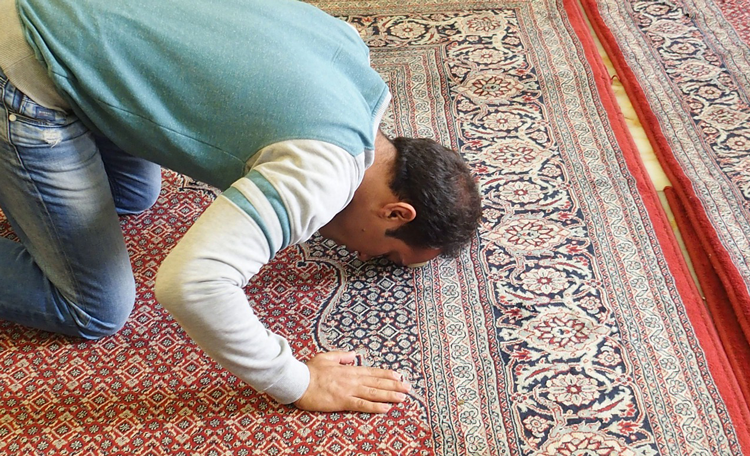Kindness In Religions Points to Our Inherent Good
Kindness in religion shows up in many ways and is the recognition of the fundamental importance of caring, loving, and cooperation for millennia. Buddhists might call this fundamental giving our Buddha nature. Christians might see this sense of giving as the image of God inherent in each of us. The importance the world’s major religions ascribe to our connections with others is captured by the following quotes about the Golden Rule also found in the Feedkindness theme song. Our formulation of the Golden Rule is that we give the same loving-kindness to others that we would like to receive ourselves.
The Feed Kindness Theme Song
Kindness In Religion: How Different Cultures Express The Importance Of Kindness

Hinduism
One should not behave towards others in a way that is disagreeable to oneself. This is the essence of morality. All other activities are due to selfish nature.
– Mahabharata, Anusasana Parva 113.8
Judaism
You shall love your neighbor as yourself.
– Leviticus 19.18
What is hateful to you, do not do to your neighbor. This is the whole Torah; all the rest is commentary. Go and learn it.
– Hillel, Talmud, Shabbath 31a


Christianity
Blessed are the merciful: for they shall obtain mercy. Blessed are the pure in heart: for they shall see God. Blessed are the peacemakers: for they shall be called the children of God.
–Matthew 5-7:27, King James Version
But the Holy Spirit produces this kind of fruit in our lives: love, joy, peace, patience, kindness, goodness, faithfulness, gentleness, and self-control. There is no law against these things!
–Galatians 5:22, New Living Translation
Islam
Not one of you is a believer until he loves for his brother what he loves for himself.
–Islam. Forty Hadith of an-Nawawi 13
If we wish Allah to be merciful to us, we must be eager to show mercy to all the living creatures of the earth. When a flower blooms, its color and scent first touch the garden near it, and then spread. In the same way, a Muslim’s should first touch those nearest to him, his family and his neighbors.


Buddhism
My religion is simple. My religion is kindness.
–Dalai Lama
Third of the Three Pure Precepts: I will do good for others. I pray that my every act will be of true benefit and that I may never inadvertently create conditions which may lead others to do harm. I will ask in the innermost place of my heart, “Is what I am about to do truly of use? Is it a fit offering? Does it accord with the purification of my heart?
–Rev. Daizui MacPhillamy, M.O.B.C.
The bodhisattva vow is the commitment to put others before oneself. It is a statement of willingness to give up one’s own well-being, even one’s own enlightenment, for the sake of others.
–Chögyam Trungpa Rinpoche
Native American Code of Ethics
Respect
Respect means “To feel or show honor or esteem for someone or something; to consider the well being of, or to treat someone or something with deference or courtesy”.
Showing respect is a basic law of life.
Respect the privacy of every person, never intrude on a person’s quiet moment or personal space.
Show deep respect for the beliefs and religion of others.
Treat the earth and all of her aspects as your mother. Show deep respect for the mineral world, the plant world, and the animal world. Do nothing to pollute our Mother, rise up with wisdom to defend her.
Listen with courtesy to what others say, even if you feel that what they are saying is worthless. Listen with your heart.

“Make your whole life unceasing gratitude. What is Zen? Simple, simple, so simple. Infinite gratitude towards all things past; infinite service to all things present; infinite responsibility to all things future.” – Goto Roshi
Kindness In Religion: How Religions Warn Against False Kindness
Acts Of Kindness Done For Selfish Reasons
Take heed that ye do not give your alms before men, to be seen of them: otherwise ye have no reward of your Father which is in heaven…. Therefore when thou doest thine alms, do not sound a trumpet before thee, as the hypocrites do in the synagogues and in the streets, that they may have glory of men. Verily I say unto you, they have their reward.
–Matthew 6:27 King James Version

Kindness In Religion: How Religions Speak Out Against Selfish Actions
The major religions have, for centuries, rules or principles prohibiting particular actions. These principles have different names in different religions: commandments, precepts or moral guidelines against selfishness. They focus on actions that cause physical pain and un-happiness.

Ten Commandments
The Ten Commandments have two affirmative commands in regards to keeping the sabbath sacred, and honoring your father and mother. The remainder are prohibitive commands, including; Do not kill, do not commit adultery, do not steal another’s belongings, do not bear false witness against someone, do not covet (another man’s house, wife, animals, or servants), and do not have any other gods or fashion any gods from scratch.

Buddhist Precepts
The first five of the ten Buddhist precepts prohibit: harming living beings, stealing, indulging in sexual misconduct, lying, and becoming intoxicated. The precepts also include a counter action to understand why its not wise to do these things. Such as respecting life, because all living beings want to live, and experience fear and struggle when being killed. They teach that being generous is more advantageous than stealing, that lying puts you at risk for losing your credibility, and that clouding the mind with intoxicating substances makes it hard to experience clarity. All in all, these virtues are necessary for an ideal state to achieve enlightenment.

Moral Guidelines
Here are three of the twenty-one moral guidelines that the Ottawa & Chippewa tribes ascribe to:
5th: Thou shalt not mimic or mock any mountains or rivers, or any prominent formation of the earth, for it is the habitation of some deity or spirit of the earth, and thy life shall be continually in hazard if thou shouldst provoke the anger of these deities.
8th: Thou shalt not mimic or ridicule the cripple, the lame, or deformed, for thou shall be crippled thyself like unto them if them shouldst provoke the Great Spirit.
20th: Thou shalt not be lazy, nor be a vagabond of the earth, to be hated by all men.
“We are all called to become saints. Many times we are tempted to think that holiness is reserved only for those who have the possibility of detaching themselves from ordinary concerns so they can dedicate themselves exclusively to prayer, but that’s not true. Holiness, is a gift God offers to everyone through his grace. It is the result of hundreds of little steps and gestures each day. And they will be different for each person depending on the circumstances of one’s life.”
Pope Francis
Replace An Eye For An Eye: Forgiveness
There are hurtful phrases in our language that justify anger and revenge without acknowledging the resulting cycles of pain. Phrases such as an ‘Eye for an eye, a tooth for a tooth’ are a sample of this thinking. Taken at face value, this cycle of abuse would not end. Thinking that anger and retaliation are solutions is like walking too far in the wrong shoes until our feet are raw. But forgiveness (self forgiveness + other forgiveness) is powerful enough to end the cycle and initiate healing. Living sustainable mindful kindness instead, not only prevents re-injury, but enhances our life experience.

“Christ’s fundamental contribution to humanity came from nine words. When Christ was nailed to a cross, he said, ‘Forgive them father, they know not what they do.’ What kind of man was that?Kurt Vonnegut, An Atheist & Humanist
And Even More Features
Which religions are oldest? And where did they come from?
A Geographical Timeline Spread Of
The Top 5 World Religions
Ready For An Epic Story? Add Saint Badass & How Love Wins To Your Reading List

Saint Badass
Personal Transcendence
In Tucker Max Hell
A beautiful story of a how a friendship blossomed through letters, from a prisoner to a professor, sharing the pain of life, and the gentle ways of mindful kindness towards personal transcendence.

How Love Wins
The Power Of Mindful Kindness
A collection of international research, personal examples from author, and methods for an easier way of living with mindful kindness.
“In material attainment you must take, in spiritual attainment you must give. In material attainment you must learn, in spiritual attainment, you must unlearn. And what does the spiritual path ask for? For this very thing: Self. Give the false self, gain the real self.”
— Hazrat Inayat Khan, founder of The Sufi Order in the west in 1914.
GET OUR FREE MINDFULLY KIND GUIDE
Join our email list for minimal updates & get a free guide! Fill in the form, verify your email and you’ll be sent a link to download our free guide.

